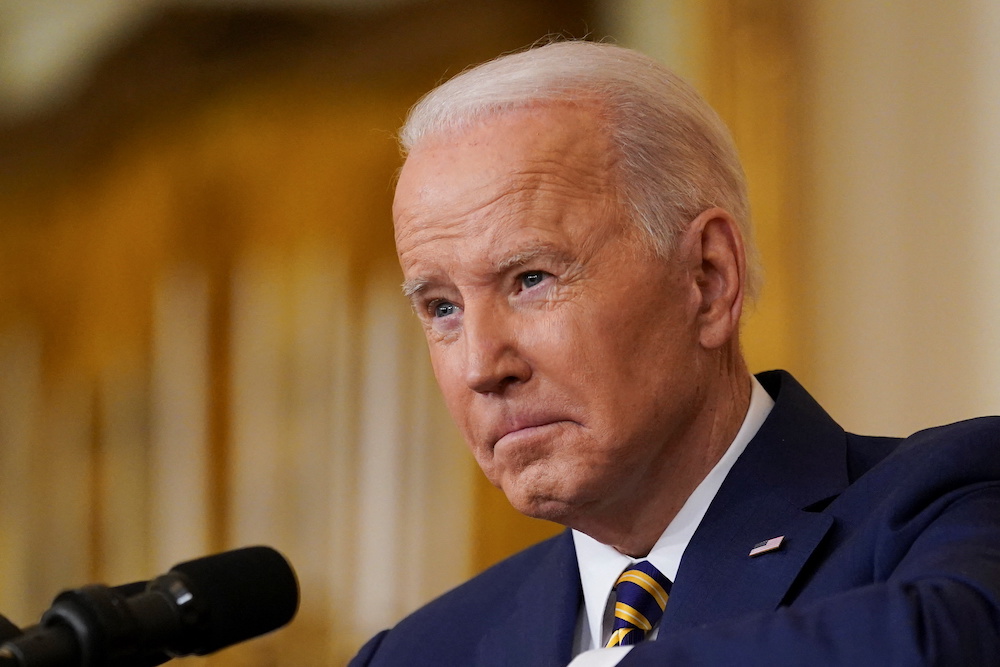WASHINGTON, April 12 ― President Joe Biden yesterday announced new measures cracking down on so-called “ghost guns” with an executive order to increase restrictions on the difficult-to-trace weapons that can be assembled at home.
At a White House gathering that brought together families and loved ones of shooting victims, Biden said the number of “ghost guns” reported by the police had increased tenfold between 2016 and 2021.
While stressing he was not opposed to the right to bear arms as allowed for in the Second Amendment to the constitution, Biden criticised the powerful National Rifle Association (NRA) gun lobby for having described his proposal as “extreme.”
“Is it extreme to protect police officers, extreme to protect our children? It isn't extreme, it's basic, common sense,” said the US leader, who handled one of the weapon kits in front of the cameras to demonstrate how the gun could be assembled in minutes.
The new rule demands that weapons part kits that can be assembled into a working firearm will be subject to the same requirements as commercially available, fully assembled guns, administration officials said.
For example, dealers selling “ghost gun” kits will now have to conduct a background check on prospective buyers.
Gun kit manufacturers must also include a serial number on key weapon components, while licensed dealers who take a “ghost gun” into their inventory must add a serial number, the US Justice Department said in a statement.
Finally, to boost tracing efforts, the new rule states that federally licensed dealers of firearms must keep records for as long as they are in business, rather than for a 20-year period, as is currently the case.
“This rule will make it harder for criminals and other prohibited persons to obtain untraceable guns, will help ensure that law enforcement officers can retrieve the information they need to solve crimes, and will help reduce the number of untraceable firearms flooding our communities,” said Attorney General Merrick Garland.
Gun violence 'epidemic'
From January 2016 to December 2021, the US Bureau of Alcohol, Tobacco and Firearms (ATF) received approximately 45,240 reports of suspected privately made firearms recovered by law enforcement, the Justice Department said. Those reports were linked to at least 692 homicide or attempted homicide investigations.
Over the past five-year period, the ATF could only trace 0.98 per cent of suspected “ghost guns” handed in by law enforcement to an individual purchaser, the department added.
According to the organisation Gun Violence Archive, more than 11,700 people have died by firearms since the beginning of the year in the United States, including suicides.
Over the whole of 2021, the number rose to 45,000 dead, said the archive, a figure which has prompted the White House to speak of an “epidemic.”
But the powers of the executive, beyond certain regulations issued by decree, are limited.
Biden yesterday repeated his call for Congress to ban the sale of assault rifles or impose a universal system of criminal and psychiatric background checks for gun buyers.
Arkansas' Republican Senator Tom Cotton said that “expanding federal gun regulations only makes it more difficult for law-abiding citizens to own guns.”
The NRA, for its part, criticised Biden for unveiling “yet another hollow plan” intended to “hearten his wealthy gun control supporters.”
Conversely, Gabrielle Giffords, a former elected Democrat in the House of Representatives and herself a survivor of a shooting, welcomed the decree.
“The fight to end gun violence is long, but we've achieved an important victory,” she said.
Eric Adams, mayor of New York ― a city struggling to tackle ghost gun use ― said that “untraceable ghost guns are just as deadly as any other firearm, and they should be treated as such, not as a novelty item or a curiosity.”
But the former police officer said “these actions are not enough” and called on Congress and the ATF to be more “focused” on the issue.
Biden on Monday nominated Steve Dettelbach, a former US attorney from Ohio, to run the ATF after the president's first nominee, a gun control advocate, ran into opposition from Republicans and some Democrats in Congress. ― AFP






















